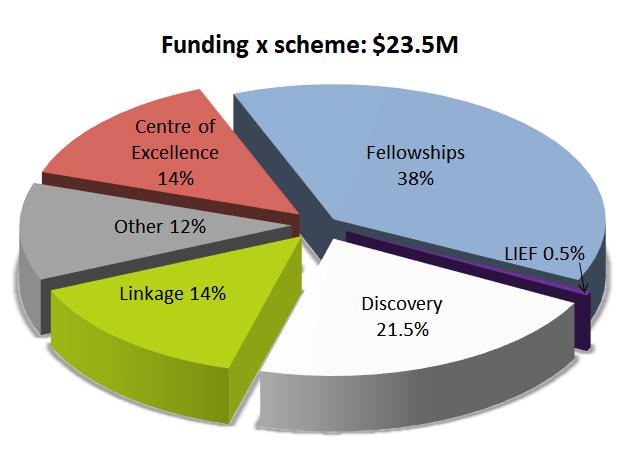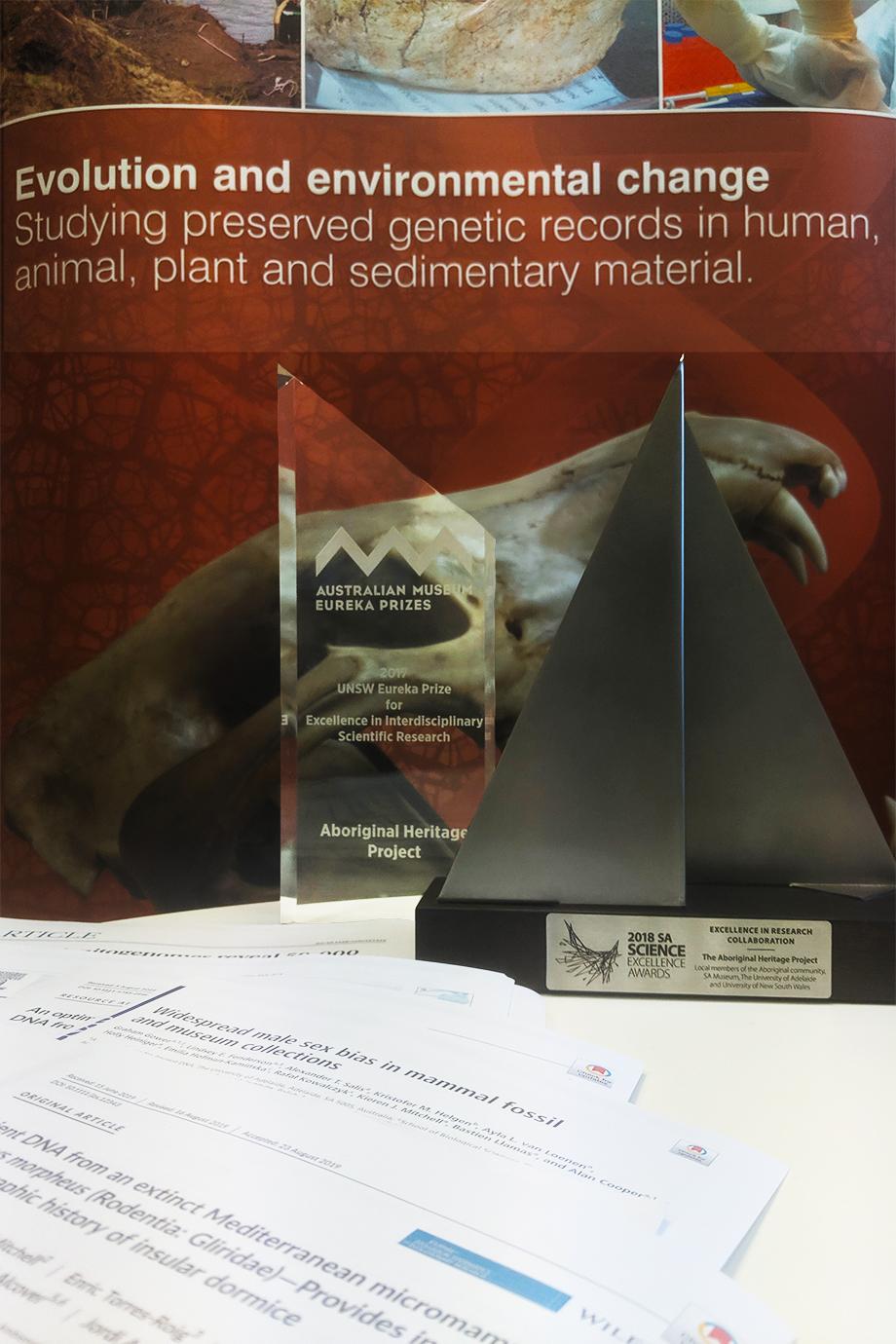About
ACAD has an international reputation as one of the leading ancient DNA research centres in the world.
We provide international standard facilities for ancient DNA research in Australia, and across the Southern Hemisphere. The purpose-built laboratories are located in the state herbarium of the Adelaide Botanic Gardens, where they are isolated from other areas of molecular biology research and are protected from environmental contamination by positive air-pressure and UV light sterilisation. The facilities include freezer rooms, sample decontamination and preparation areas, and specialist still-air working areas for ancient human, animal, plant, sedimentary and microbial DNA studies.
Research is currently being conducted on bones, plants, soils and other biological specimens (especially from the Holarctic), Pleistocene megafauna and extinct species (North/South America, Australia, and worldwide) and evolutionary processes on a variety of time scales (population genetics, phylogeography, systematics, and computational-based phyloinformatics and molecular clocks), and is encapsulated by two overarching research streams - environmental change and evolutionary biology.
ACAD is supported by the Environment Institute and is a major research initiative of the School of Biological Sciences and the Faculty of Sciences, Engineering and Technology at the University of Adelaide.
Evolutionary biology
Our scientists are at the forefront of key research into the phylogenetic relationships and phylogeography of extinct mammal and bird taxa.
Species of interest include the Australian megafauna, New Zealand birds, Ice Age bison, horses, sabre-tooth cats and a variety of ancient human remains – the latter as part of the National Geographic Society’s Genographic Project.
Population genetics studies of temporally distributed data are a particularly powerful form of analysis as they can identify and quantify the evolutionary impacts of major environmental change.
Environmental change
We are involved in a variety of genetic studies of long-term records of environmental change and human impact on biodiversity, ecosystems, and landscape stability.
Source materials include sedimentary deposits such as lakes, rivers and oceans; biominerals including bones, teeth and stalactites; ice cores; and animal and plant products such as hair, dung, eggs, seeds, roots and leaves.
We explore important topics including the timing and nature of changes in patterns of biodiversity, salinity and vegetation over the recent and distant past. This data is critical for relating information about past climates and periods of climate change directly to the biological impacts on animal and plant populations.
-
Our mission
At ACAD, our mission is to:
- Reconstruct past ecosystems and evolutionary lineages using trace amounts of environmental and sub fossil DNA to allow prediction of future impacts and the consequences of climate change.
- Use genomic information to reconstruct the evolution of humans, domesticates, plants and animals.
- Identify environmental genomic signals through comparison to reference collections in museums and herbaria.
- Expand the repertoire of forensic techniques through innovative molecular approaches to analyse new materials.
- Solve long-standing mysteries by retrieving genetic information from the past.
-
Bioinformatics capabilities
We have invested in high-powered computing capacity to develop in-house pipelines and algorithms for bioinformatics capabilities.
Aided by our annual international bioinformatics workshops, our team is working on the latest software for the analysis of Next Generation Sequencing (NGS), genomics and metagenomics data, including tools and methods to handle NGS and SNP array data. Analyses involve a variety of bioinformatic and computational phylogenetic and population genetic approaches, including collaborations with leading Australian and international experts.
-
Research income

ACAD's principal source of Category 1 funding is the Australian Research Council, which supports close to 90% of the centre's staffing profile.
Of the $24m worth of funding awarded, $8.2m is attributed to Fellowship grants, followed by $5m for Discovery, $3.2m toward Centre of Excellence, with the remainder toward LIEF schemes and other sources (consultancies, wildlife agencies, primary resources).
ACAD includes a DNA forensic facility for cutting-edge forensic research and service delivery to police agencies, defence and humanitarian organisations, where consultancy income is sourced.
As a leading internationally recognised centre, ACAD is committed to mentoring early career researchers with its annual training workshops in advanced bioinformatics, national and international student internships and research visitors (over 50 to date) offering training in ancient DNA laboratory protocols, data handling/analysis, bioinformatics, forensic and Next Generation Sequencing techniques.
These visits have been integral to our grant and published work achievements, as well as fostering collaborative links.
-
Research recognition

- Dan Bonsu, Chartered Society of Forensic Sciences award, 2020.
- Olivia Johnson, Westpac Future Leaders Scholarship, 2020.
- Ray Tobler, Daniel Walker Medal, University of Adelaide, 2019.
- Christian Huber, Daniel Walker Medal, University of Adelaide, 2018.
- Laura Weyrich, mid-career researcher award (Sciences), University of Adelaide, 2018.
- Aboriginal Heritage Project, South Australian Science Award for Excellence in Research Collaboration, 2018.
- Matilda Handsley-Davis, Westpac Future Leaders Scholarship, 2018.
- Aboriginal Heritage Project, Eureka Prize for Excellence in Interdisciplinary Scientific Research, 2017.
- Laura Weyrich, Tall Poppy Award, 2016
- Felicia Bardan, Hugh Martin Weir Prize - research into any aspect of Australia's war service personnel, 2016.
- Kieren Mitchell, Doctoral Research Medal (only 15 awarded annually) for outstanding research at PhD level, 2016.
- Jeremy Austin, inaugural Australian Science Media Centre’s award for ‘most engaged UoA researcher with the media', 2016
- Denice Higgins, 2 service medals from the Australian Federal Police, the Overseas Humanitarian Service Medal and Operations Medal for her work in the Netherlands in the shot-down Malaysia Airlines MH17 plane, 2015.
- Andrew Farrer, University's 3 Minute Thesis competition and People's Choice award, 2015.
- Laura Weyrich, inaugural Women's Research Excellence Awards (12 awarded university wide) as an early career researcher, 2015.
- Andrew Farrer, Royal Society of South Australia's Postgraduate Student Prize for best presentation, 2014.
- Andrew Farrer, Lawrence Forbes & Decie Denholm PhD scholarship, 2013.
- Alan Cooper, Royal Society of South Australia's highest honour, the Verco Medal, 2013
- Jennifer Templeton, 1st prize for Best Poster, Asia-Pacific Sequencing Summit, Bali, 2012
- Alan Cooper, Senior Scientist of the Year, Faculty of Sciences, Engineering and Technology, University of Adelaide (co-awarded with Jeremy Timmis), 2012
- Jeremy Austin, Unsung Hero of South Australian Science Award, 2012
Sending us samples
Due to the nature of our research, our extensive sample collection enters our ancient DNA laboratory under quarantine protocols. If you will be sending us samples, please read our import guide.


